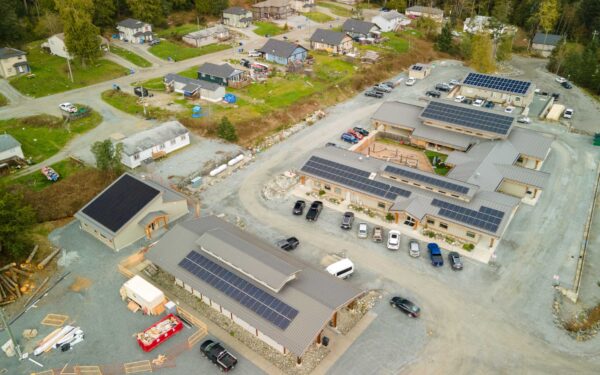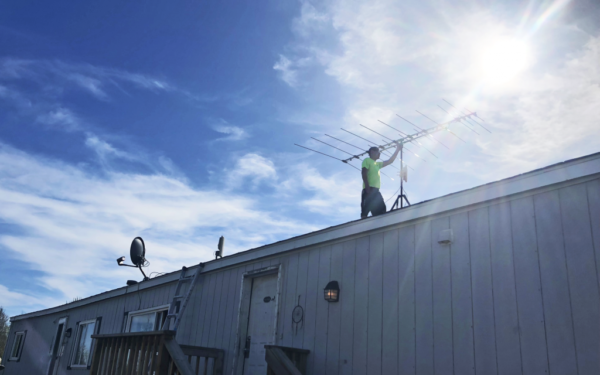OTTAWA, JULY 27, 2022 – Today, CIRA has announced the latest recipients of its $1.25 million Community Investment Program granting initiative, supporting Canada’s digital development through a selection of community-led projects.
This year, CIRA’s Community Investment Program Grants funded projects from all three of Canada’s northern territories and emphasizes initiatives that will benefit Indigenous communities. Reliable online connectivity continues to be an urgent priority in First Nations communities, exacerbated by the COVID-19 pandemic, and CIRA is pleased to be able to contribute to local solutions among this year’s grants.
“As the lasting effects of the global pandemic have changed the way we all work and live, there is no question that funding projects that address digital equity is essential,” said Byron Holland, CIRA president and CEO. “CIRA is proud to support this important work being done in communities across Canada to tackle the issues that are most pressing at a local level through our CIRA Community Investment Program Grants —an initiative that is unlike any other in Canada. The projects funded showcase the leadership, ingenuity and foresight of communities across the country, and we look forward to seeing the positive impacts they will have on Canada’s digital landscape.”
“We are grateful for CIRA’s support, that is directly enabling delivery of the Connected Elders & Youth program in the Kivalliq region of Nunavut this year,” said Nicole Perry, director of national programs at HelpAge Canada. “We began with a goal to enable intergenerational connection through teaching and learning digital skills. We then realized the beauty of the Connected Elders & Youth program is about connecting in so many other ways. The program creates opportunities to gather, to share Inuit language and culture, to speak with friends and family in other communities, to join online communities, and even opportunities for participation in the workforce. On behalf of HelpAge Canada and our partners – Pulaarvik Kablu Friendship Centre and Pinnguaq Association, Thank You – Nakurmiik.”
CIRA Grants continue to fund a wide range of projects to build a resilient, trusted and secure internet for all Canadians. This includes CIRA’s first-ever grant for a project in Prince Edward Island, provided to S.T.E.A.M. PEI Ltd.’s Cybersafe Islanders project, which aims to address cybersafety concerns among youth. From investing in a curriculum to build online confidence for youth with sight loss, to helping a First Nations community in the North defend against cyberattacks—investing in digital equity projects means Canadians can reliably connect, learn the digital skills they need to feel empowered and thrive online. A full list of the projects can be found below. Since CIRA Grants’ inception in 2014, CIRA has invested $10.45M towards 201 digital equity projects across Canada.
Key facts:
Here is the breakdown of this year’s 16 grant recipients:
- 11 (68 per cent) focus on serving Indigenous communities
- 5 (31 per cent of) funded projects are Indigenous-led
- 8 projects (50 per cent) serve Canada’s northern territories and provinces: Nunavut, Northwest Territories, Yukon, northern Alberta and northern British Columbia
- 8 (50 per cent) serve rural and remote communities
- 13 (81 per cent) focus on serving students
- This year’s areas of focus are digital literacy, infrastructure and cybersecurity
2022 Community Investment Program Grant recipients
Alberta
Actua | Digital literacy
Actua seeks to improve digital equity in Alberta by engaging Indigenous youth in digital skill development experiences. In collaboration with Indigenous communities, Actua helps build teachers’ capacity to incorporate culturally inclusive, land-based digital skills lessons into the classroom. This program aims to serve Indigenous youth in the Treaty 7 region.
Portage College, Education, Arts and Culture | Digital literacy
Portage College will create free, open-source hands-on workshops to encourage the safe adoption of broadband technology and the confident use of the internet in First Nation and Métis communities with new connectivity in Northeastern Alberta.
Stó:lō Community Futures Corporation | Digital literacy
This project will build a digital skills training and entrepreneurship program to empower Indigenous and non-Indigenous entrepreneurs, youth and elders/seniors throughout rural communities within S’ólh Téméxw and Chilliwack.
British Columbia
ASTC Science World Society | Digital literacy
This project seeks to implement workshops on digital literacy, computational thinking and coding as well as create resources for 16,000 students in remote, rural, Indigenous and other communities across British Columbia.
Leq’a:mel Development Corporation | Infrastructure
The Leq’a:mel Development Corporation will develop a fibre optic network and hardware upgrade so that the Leq’a:mel Development Corporation can provide more own-source revenue and stable internet to Leq’a:mel First Nation (LFN). This lays the foundation to grow additional LFN-owned businesses.
Malahat Nation | Infrastructure
This project will build on infrastructure to bring high speed internet and build digital literacy skills for low-income Indigenous households and students in the Malahat Nation. This will enable community members to participate and succeed in the digital economy.
Simon Fraser University, SFU Surrey – TD Community Engagement Centre | Digital literacy
SFU will create an after-school digital citizenship program for Surrey students in grades 5-7 covering topics such as health and well-being online, privacy, safety, digital commerce, relationships, cyberbullying and social media wellness.
Takla Nation | Infrastructure
This project will seek to connect the remainder of Takla Landing homes and buildings to existing coaxial community lines, setting in place the infrastructure needed for future growth and development.
Northwest Territories
Behdzi Ahda First Nation Band | Cybersecurity
Behdzi Ahda First Nation Band will produce a community cybersecurity plan and training program to increase the Nation’s self-defense capacity against external cyber threats.
Nunavut
HelpAge Canada | Digital literacy
HelpAge Canada aims to create an intergenerational digital literacy training program for Elders in Nunavut, delivered by Indigenous youth in seven Kivalliq communities with a learning framework specific to northern and Inuit culture. The program will simultaneously employ Inuit youth, strengthen community relations and preserve culture and language.
Ontario
Black Boys Code Society | Digital literacy
This project will provide Black girls in the Greater Toronto Area with workshops that will build the cognitive and technical skills required to become active and confident digital citizens.
Brock University | Digital literacy
Brock University will develop gendered, Indigenized digital literacy workshops and modules on using the internet for promoting health, wellbeing and developing economic independence. This is created by and for Northern Indigenous women based on their needs and ways of knowing.
Canadian National Institute for the Blind | Digital literacy
The Canadian National Institute for the Blind will create a curriculum to educate and empower young people with sight loss to access the internet and participate in online community spaces safely and equitably.
Connected North | Digital literacy
Connected North will create an expanded menu of culturally relevant, Indigenous content and experience providers—available for digital education delivery—highlighting Indigenous role models to over 15,000 Grade 6-12 students in remote communities across Canada.
Prince Edward Island
S.T.E.A.M. PEI Ltd. | Digital literacy
S.T.E.A.M. PEI Ltd.’s Cybersafe Islanders project seeks to address youth cybersafety concerns, with auxiliary sessions for parents and teachers to support their children online on topics like parental control and online activities popular with youth.
Quebec
Royal Institution for the Advancement of Learning / McGill University, Centre for Media, Technology and Democracy | Cybersecurity
The Youth Assembly on Online Safety is a youth-led citizens’ assembly on children’s online safety that will centre the experiences of Canadian youth to inform Canadian policymakers on how best to protect and empower children online. Participants will be from each province and territory, with special care given to select youth from Indigenous, northern and rural communities.
About CIRA and CIRA Grants
CIRA is the national not-for-profit best known for managing the .CA domain on behalf of all Canadians. The organization also offers enterprise-quality registry, DNS and cybersecurity services to organizations across Canada and around the world. As a member-based, mission-driven not-for-profit, CIRA also has a much broader goal to promote a trusted internet for Canadians. CIRA Grants is one of our most valuable contributions toward this goal and funds projects in infrastructure, digital literacy, cybersecurity and community leadership. Every .CA domain name registered or renewed contributes to this program.





